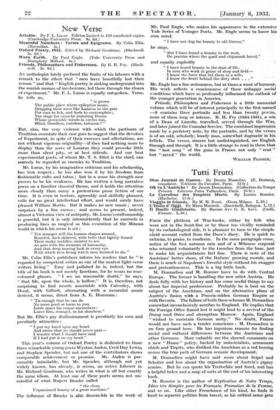New Verse
Arladne. By F. L. Lucas. Edition limited to 950 numbered copies. (Cambridge University Press. 8s. 6d.) Ax anthologist lately prefaced the fruits of his labours with a remark to the effect that "men have boastfully lost their
reason." and that " English poetry is sinking underground into
the marish morass of incoherence, led there through the cloaca of experiment." Mr. F. L. Lucas is equally outspoken. Verse, he tells us, " is grown The public place where epileptics moan, ' Dragging then sores like Lazarus to the gate For curs to lick, and fools to contemplate ; The stage for eunuchs imitating Donne Whose periwinkle minds in circles run, Blind, bloodless, tasteless, tortuous ! "
But, alas, the very violence with which the partisans of Tradition overstate their case goes to suggest that the devotees of Experiment, in spite of their excesses and affectations, are not without vigorous originffiity—if they had nothing more to display than the sores of Lazarus they could provoke little more than silent pity, or at best ridicule. And our best experimental poets, of whom Mr. T. S. Eliot is the chief, can scarcely be regarded as enemies to Tradition.
Mr. Lucas, by his imaginative criticism and his scholarship. has won respect ; he has also won it by his freedom from fashionable cults and tabus ; but in a sense his strength now proves to be his weakness. He has written a long narrative poem on a fainiliar classical theme, and it holds the attention more closely than many a pretentious prose fiction of our time. It is even in texture, agreeably and skilfully phrased, calls for no great intellectual effort, and would surely have pleased William Morris. But it makes no new music ; never surprises by a fine excess ; and seems to present, indeed, almost a Victorian view of antiquity. Mr. Lucas's craftsmanship is graceful, but it is only intermittently that he succeeds in producing lines as magical as this evocation of the Minoan world in which his scene is set.: " Yet stranger still the human shapes around, Bearded, dark-skinned, with belts that tightly bound Their snaky middles, sinister to see As ants with the measure of humanity, And that deep musing look in every eye With which men living watch men doomed to die."
Mr. Colin Ellis's publishers inform his readers that he "is regarded by competent critics as one of the neatest light-verse writers living." Easy and polished he is, indeed, but the title of his book is not merely facetious, for he wears no rose- coloured glasses. "I see no reasonable doubt," he says, that life, upon the whole, is hollow." It is, therefore, not surprising to find moods associable with Calverley, with Hood, with Gilbert, alternating with a mournful music derived, it seems, direct from A. E. Housman: " 'Tin enough that he can do No more good or harm to you. Little space his corpse encumbers : Leave him, stranger, to his slumbers."
But Mr. Ellis's gay disillusionment is peculiarly his own and peculiarly attractive : "I put my hand upon my heart
And swore that we should never part—
I wonder what I should have said If I had put it on my head."
This year's volume of Oxford Poetry is dedicated to those three remarkable young poets Wystan Auden, Cecil Day Lewis, and Stephen Spender, but not one of the contributors shows comparable achievement or promise. Mr. Auden is pre- sumably inimitable, but Mr. Spender, although not yet widely known, has already, it seems, an active follower in Mr. Richard Goodman, who writes in what is all but exactly the same idiom. At least one of these poets seems not un- mindful of what Rupert Brooke called
"the clean Unpassioned beauty of a great machine."
The influence of Brooke is -alsb discernible in the work of Mr. Paul Engle, who makes his appearance in the extensive Yale Series of Younger Poets. Mr. Engle seems to know his own mind.
"I have not dug for beauty in old Greece," he sings,
"But I have found a beauty in the west, On prairies where the quail and chipmunk breed," and equally explicitly "I have found beauty in the dust of life.
In men who work in grime of shop and field- - I know the force that led them to a wife, I know the heart behind the dirty shirt . . . " --
Mr. Engle has a fine seriousness, but at times a want of humour. His work reflects a conciousness of those unhappS, social canditions which have so profoundly influenced the outlook Of the younger generation in America.
Friends, Philosophers and Fishermen is a little memorial volume which will be of interest principally to the first-named —it contains three portraits and less than twenty pcems, none of them long or intense. B. H. Fry (1884-1931), a min of a Dean of Lincoln, travelled, served through the War, and later joined the Consular Service. The combinedimpression made by a prefatory note, by the portraits, and the verses is of an odd, scholarly, lonely than, soinewhai'dogmatic in his beliefs. The verses, sincere but undistinguished, are English through and through. It is a little strange to read in them that the "last song" of the . guns in France not only " rent " but " saved " the world.
WILLIAM PLOME-1




































 Previous page
Previous page